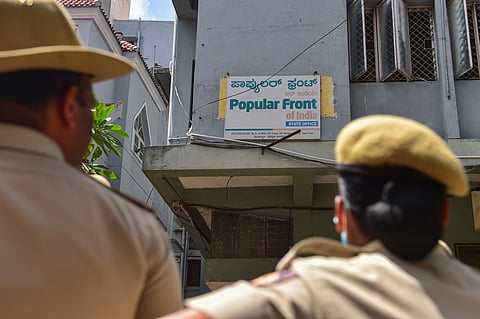How PFI evolved over years, saw crackdown coming
KOZHIKODE: The leadership of the Popular Front of India (PFI) has been expecting a crackdown anytime after the Narendra Modi government came to power in 2014. The apprehension increased when the NDA returned to power in 2019.
According to the sources, the organisation has prepared a plan for how to operate in the event of a nationwide ban. The PFI’s legal team is ready to question it in court if the government imposes a ban and resources have been mobilised to mount a campaign against the crackdown. The PFI has been under the watchful eyes of security agencies from the days of its formation. The organisation came into the public domain in 1993, piggy-riding on the wounded sentiments of the Muslim community after the demolition of the Babri Masjid, through its earlier incarnations that existed in different forms in North Kerala.
The Nadapuram Defence Force was the prototype of the outfit that later became the National Development Front (NDF). The Muslim youths who wanted to resist the “CPM aggression” formed the defence force with the help of like-minded persons.
E Aboobacker, a teacher who was an active leader of the Students Islamic Organisation of India, P Koya, an English teacher at a government college, and E M Abdurehman, a librarian, were among the core group. The group was active in the Babri Masjid Action Committee, which spearheaded many agitation programmes for the preservation of the mosque.
Allegations and controversies were born along with the birth of the organisation. The Muslim organisations felt that NDF was an outfit that led the youth to extremist thinking. It was accused of misrepresenting the religion to suit its needs.
The organisation was widely discussed during the time of the massacre of nine people at Marad in 2002. Controversies continued even after the NDF became PFI after merging with Karnataka Forum for Dignity (KFD) and Manitha Neethin Pasaria (MN) in Tamil Nadu in 2006. The outfit hogged the limelight when its cadre was arrested for alleged arms training at Narath in Kannur in 2013. The most talked-about case involving the PFI was the chopping of Prof. T J Joseph's hands off for allegedly insulting Prophet Muhammad.
The PFI became the centre of attraction in 2016-17 when around 15 youth from Kerala left the country to join the Islamic State (IS) in Afghanistan and Syria. It was also accused of creating trouble during the anti-CAA agitation in Delhi.
The PFI has formed a political front called the SDPI, the student's wing Campus Front of India and the Women’s Front of India. The National Coordination of Human Rights Organisations (NCHRO); India Fraternity Forum have also been set up by PFI supporters.

